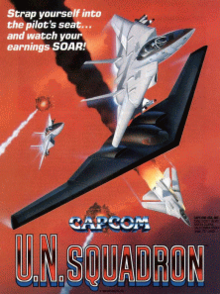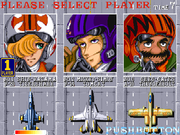This is an old revision of this page, as edited by Mika1h (talk | contribs) at 10:27, 21 April 2020. The present address (URL) is a permanent link to this revision, which may differ significantly from the current revision.
Revision as of 10:27, 21 April 2020 by Mika1h (talk | contribs)(diff) ← Previous revision | Latest revision (diff) | Newer revision → (diff)| This article needs additional citations for verification. Please help improve this article by adding citations to reliable sources. Unsourced material may be challenged and removed. Find sources: "U.N. Squadron" – news · newspapers · books · scholar · JSTOR (April 2009) (Learn how and when to remove this message) |
| U.N. Squadron | |
|---|---|
 Sales flyer for the arcade version Sales flyer for the arcade version | |
| Developer(s) | Capcom |
| Publisher(s) | Capcom U.S. Gold (computers) |
| Composer(s) | Arcade version Manami Matsumae & Takashi Tateishi SNES-version Mari Yamaguchi & Yoshihiro Sakaguchi |
| Platform(s) | Arcade, Amiga, Amstrad CPC, Atari ST, Commodore 64, SNES, ZX Spectrum |
| Release | August 1989 SNES |
| Genre(s) | Scrolling shooter |
| Mode(s) | Single-player |
| Arcade system | CPS-1 |
U.N. Squadron is a 1989 side-scrolling shooting game released by Capcom for the CPS arcade hardware and for the Super Nintendo Entertainment System. The game was released in Japan as Area 88 (Japanese: エリア88, Hepburn: Eria Hachi-Jū-Hachi), and is based on the manga series of the same name, featuring the same main characters. Here, their mission is to stop a terrorist group known as Project 4. It was followed by a spiritual successor Carrier Air Wing.
Gameplay

The game is a typical side scrolling shooter, going against the trend of other Capcom shooters, such as 1942, and 1943: The Battle of Midway, which are vertically scrolling shooters. However, like other Capcom shooters, the player has an energy bar that is consumed over the course of a single life as the player sustains damage. This trait is highly uncommon among other comparable arcade-style shooters which normally use a system of reserve lives, where one of which is lost upon a single enemy hit. Before entering a level, the player can purchase special weapons or added defenses in the shop. The player earns money to buy weapons by destroying enemy planes and vehicles during levels and, when the level is finished, any unused weapons are converted back into money.
The player can choose between three mercenary pilots: Shin Kazama, Mickey Simon, and Greg Gates. Each pilot flies a specific plane and has slightly different capabilities.
In the Super NES version, each pilot can use a range of planes. All pilots start out with $3000 and the basic F8 Crusader, and can buy other aircraft and weapons as they progress.
Development
Capcom director Yoshiki Okamoto commented that the game was part of a broader strategy of Capcom at the time to appeal to a wider audience by using established characters from other media, as their original characters could be too niche. In addition to Area 88, he cited games based on Willow and Destiny of an Emperor as part of this strategy.
Release
Area 88 was ported to the home console Super Nintendo and released in Japan on July 26 1991. In America and Europe it was re-titled UN Squadron.
Reception
Upon release, the Japanese gaming publication Weekly Famitsu gave the Super Famicom (Super Nintendo) version a 28 out of 40 score.
IGN ranked U.N. Squadron 37th on its "Top 100 Super Nintendo Games" list, which made it the highest ranking side scroller shooter game on that list.
Entertainment Weekly gave the Super Nintendo version of the game an A, and picked the game as the #12 greatest game available in 1991.
References
- "Super NES Games" (PDF). Nintendo. Archived from the original (PDF) on 2016-03-03. Retrieved 2012-07-25.
- ^ "エリア88 [スーパーファミコン] / ファミ通.com". www.famitsu.com. Archived from the original on 2018-06-30. Retrieved 2018-07-26.
- "U.N. Squadron Release Data". GameFAQs. Archived from the original on 2013-08-09. Retrieved 2013-06-15.
- ^ "Developer Interview Capcom Developer: Yoshiaki Okamoto, Noritaka Funamizu". Gamest (38). Shinseisha Ltd.: 10–29. (Translation) Archived 2017-05-31 at the Wayback Machine
- "UN Squadron - #37 Top 100 SNES Games - IGN". Archived from the original on 2017-09-01. Retrieved 2017-09-01.
- "The latest video games". EW.com. Archived from the original on 2016-06-05. Retrieved 2018-11-03.
- "Video Games Guide". EW.com. Archived from the original on 2017-02-19. Retrieved 2018-11-03.
External links
- U.N. Squadron at Arcade-History
- Area 88 at the Killer List of Videogames
- U.N. Squadron at the Killer List of Videogames
- U.N. Squadron at MobyGames
- UN Squadron SNES review from Mean Machines Archive
| Area 88 by Kaoru Shintani | |
|---|---|
- 1989 video games
- Amiga games
- Amstrad CPC games
- Arcade games
- Atari ST games
- Capcom games
- Commodore 64 games
- Cooperative video games
- Head-to-head arcade games
- Horizontally scrolling shooters
- Super Nintendo Entertainment System games
- U.S. Gold games
- Video games based on anime and manga
- Video games developed in Japan
- Video games scored by Manami Matsumae
- ZX Spectrum games
- Single-player video games